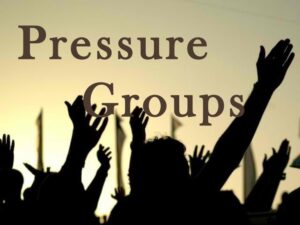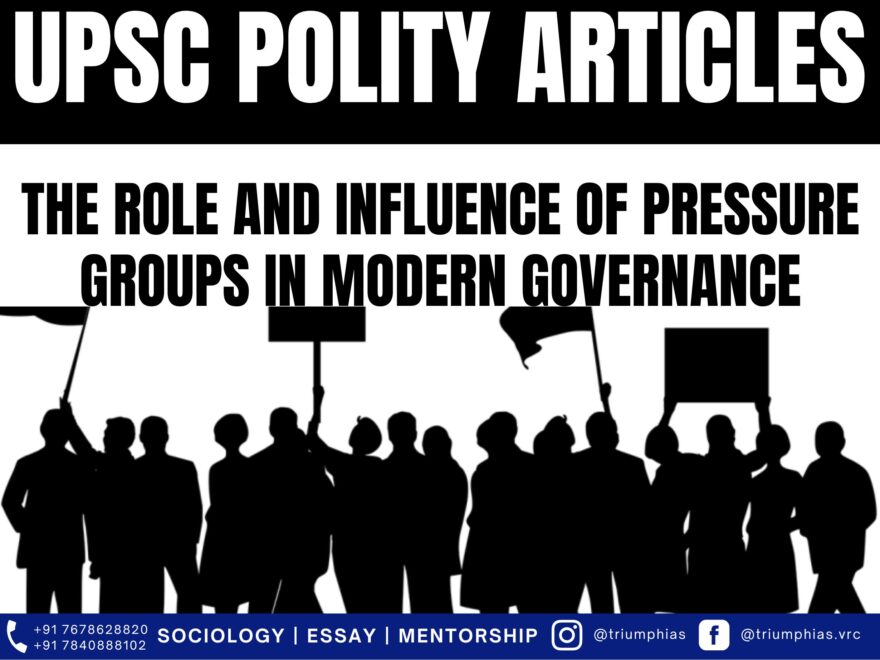The Role and Influence of Pressure Groups in Modern Governance
(Relevant for Polity Section of General Studies Paper Prelims/Mains)

Pressure Groups
Pressure groups are organizational entities that employ influence tactics on a nation’s political or administrative framework with the goal of gaining advantages and promoting their specific interests. These groups assume a significant role in governance, as their primary objective is to ensure that legislation and governmental decisions align with their interests. For example, during the Sardar Sarovar Project (SSP) in Gujarat, when the interests of a particular section and region were at stake, pressure groups endeavored to raise environmental consciousness by furnishing essential information to the affected individuals.
Pressure groups, in contrast to political parties, are primarily established to address immediate concerns, often having a more transient nature than political parties. They exhibit greater adaptability compared to political parties, as they do not engage in electoral campaigns and power-seeking endeavours. These groups typically lack defined political ideologies and tend to sway the governing authority to fulfil their specific demands. For instance, the Self-Employed Women’s Association (SEWA) has wielded influence over the government to enhance its policies regarding women workers’ rights. Similarly, the Mazdoor Kisan Shakti Sangathan spearheaded a people’s movement that compelled the government to enact the ‘Right to Information’ law.
They Employ Various Strategies to Pursue their Interests, Including:
- Establishing amicable relations with the ruling political party: Through such interactions, pressure groups exert influence on lawmakers, advocating for the inclusion or removal of specific provisions in legislation.
- Providing financial support to political parties: Pressure groups extend financial backing to political parties during election periods and sometimes even during non-election periods. They also ensure that candidates from their preferred party secure executive positions within the government.
- Cultivating close relationships with bureaucratic institutions: Pressure groups maintain positive relations with the bureaucracy and high-ranking officials to persuade them to align with their perspectives.
- Securing representation on government committees: Pressure groups strive to have their representatives participate in various government committees, especially when their interests are at stake.
- Resorting to tactics such as strikes, protests, and sit-ins: Groups like trade unions employ methods like strikes, demonstrations, and gheraos to compel the authorities to meet their demands.
- Funding caste and religious organizations: To safeguard their interests, pressure groups also employ traditional means of leveraging caste, creed, and religion. They extend financial support to caste and religious organizations, contributing funds during public gatherings to gain popularity among these groups.
Pressure groups are an essential dimension of any democracy, yet they can endanger democracy if sectional groups undermine the public interest or if the methods, they use are corrupt or intimidating.
Sample Question for UPSC Sociology Optional Paper:
1. Question: What role do pressure groups play in a democratic setup?
Answer:
Pressure groups serve as intermediaries between the government and the citizens, influencing policy-making and governance to align with specific interests.
2. Question: How do pressure groups differ from political parties?
Answer:
Unlike political parties, pressure groups do not engage in electoral campaigns and are often established to address immediate concerns. They lack a defined political ideology and focus on swaying governmental decisions in their favor.
3. Question: What strategies do pressure groups employ to influence policy-making?
Answer:
Pressure groups employ various strategies such as establishing relations with political parties, providing financial support, cultivating relationships with bureaucratic institutions, and securing representation on government committees.
4. Question: How did the Mazdoor Kisan Shakti Sangathan influence the government?
Answer:
The Mazdoor Kisan Shakti Sangathan spearheaded a people’s movement that compelled the Indian government to enact the ‘Right to Information’ law.
5. Question: Can pressure groups pose a threat to democracy? Explain.
Answer:
Yes, pressure groups can endanger democracy if they undermine the public interest or employ corrupt or intimidating methods to achieve their objectives.
To master these intricacies and fare well in the Sociology Optional Syllabus, aspiring sociologists might benefit from guidance by the Best Sociology Optional Teacher and participation in the Best Sociology Optional Coaching. These avenues provide comprehensive assistance, ensuring a solid understanding of sociology’s diverse methodologies and techniques.
Pressure Groups, Policy-making, Sardar Sarovar Project, Mazdoor Kisan Shakti Sangathan, Right to Information, Political Parties, Governance, Democracy, SEWA, Mazdoor Kisan Shakti Sangathan, Right to Information, Political Parties, Bureaucracy, Tactics, Protests, Strikes, Financial Support

Choose The Best Sociology Optional Teacher for IAS Preparation?
At the beginning of the journey for Civil Services Examination preparation, many students face a pivotal decision – selecting their optional subject. Questions such as “which optional subject is the best?” and “which optional subject is the most scoring?” frequently come to mind. Choosing the right optional subject, like choosing the best sociology optional teacher, is a subjective yet vital step that requires a thoughtful decision based on facts. A misstep in this crucial decision can indeed prove disastrous.
Ever since the exam pattern was revamped in 2013, the UPSC has eliminated the need for a second optional subject. Now, candidates have to choose only one optional subject for the UPSC Mains, which has two papers of 250 marks each. One of the compelling choices for many has been the sociology optional. However, it’s strongly advised to decide on your optional subject for mains well ahead of time to get sufficient time to complete the syllabus. After all, most students score similarly in General Studies Papers; it’s the score in the optional subject & essay that contributes significantly to the final selection.
“A sound strategy does not rely solely on the popular
Opinion of toppers or famous YouTubers cum teachers.”
It requires understanding one’s ability, interest, and the relevance of the subject, not just for the exam but also for life in general. Hence, when selecting the best sociology teacher, one must consider the usefulness of sociology optional coaching in General Studies, Essay, and Personality Test.
The choice of the optional subject should be based on objective criteria, such as the nature, scope, and size of the syllabus, uniformity and stability in the question pattern, relevance of the syllabic content in daily life in society, and the availability of study material and guidance. For example, choosing the best sociology optional coaching can ensure access to top-quality study materials and experienced teachers. Always remember, the approach of the UPSC optional subject differs from your academic studies of subjects. Therefore, before settling for sociology optional, you need to analyze the syllabus, previous years’ pattern, subject requirements (be it ideal, visionary, numerical, conceptual theoretical), and your comfort level with the subject.
This decision marks a critical point in your UPSC – CSE journey, potentially determining your success in a career in IAS/Civil Services. Therefore, it’s crucial to choose wisely, whether it’s the optional subject or the best sociology optional teacher. Always base your decision on accurate facts, and never let your emotional biases guide your choices. After all, the search for the best sociology optional coaching is about finding the perfect fit for your unique academic needs and aspirations.
To master these intricacies and fare well in the Sociology Optional Syllabus, aspiring sociologists might benefit from guidance by the Best Sociology Optional Teacher and participation in the Best Sociology Optional Coaching. These avenues provide comprehensive assistance, ensuring a solid understanding of sociology’s diverse methodologies and techniques. Sociology, Social theory, Best Sociology Optional Teacher, Best Sociology Optional Coaching, Sociology Optional Syllabus.
Best Sociology Optional Teacher, Sociology Syllabus, Sociology Optional, Sociology Optional Coaching, Best Sociology Optional Coaching, Best Sociology Teacher, Sociology Course, Sociology Teacher, Sociology Foundation, Sociology Foundation Course, Sociology Optional UPSC, Sociology for IAS,
Follow us :


https://t.me/VikashRanjanSociology
Find More Blogs
|
Scope of the subject and comparison with other social sciences |
|||
|
|
|
|
Modernity and social changes in Europe |

